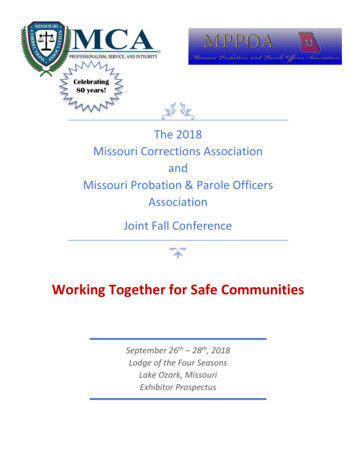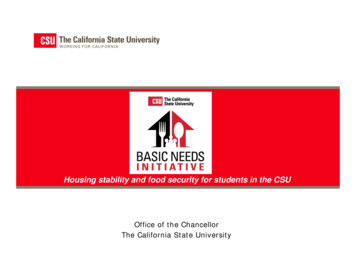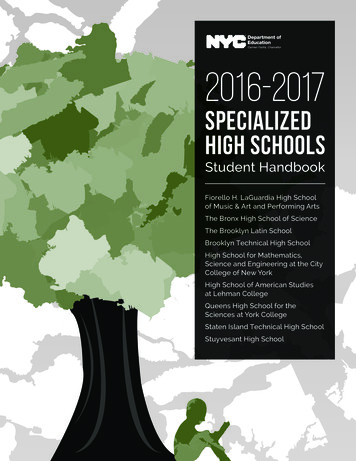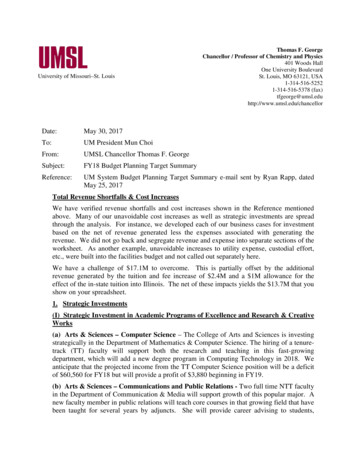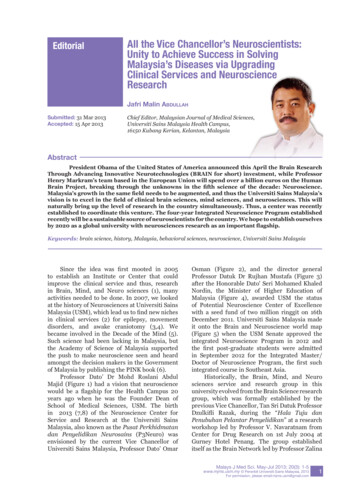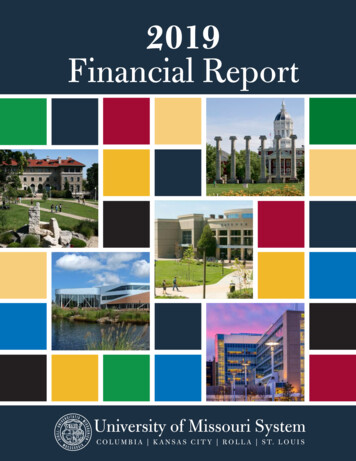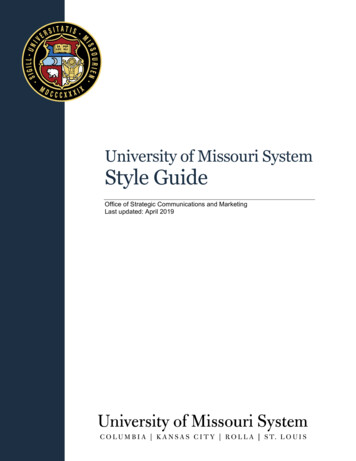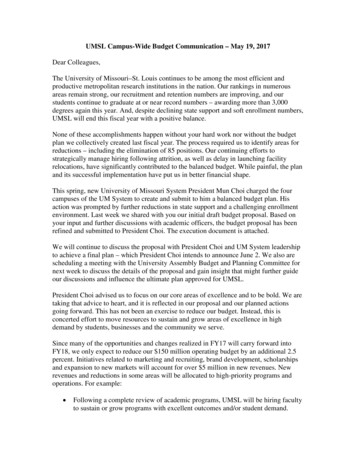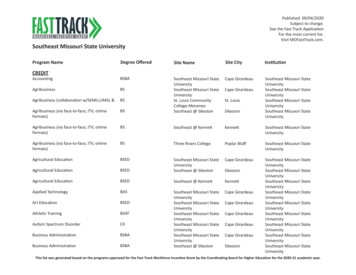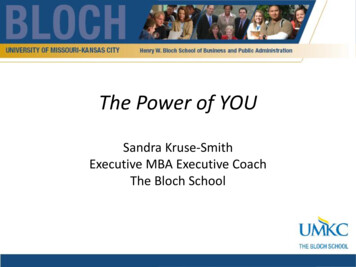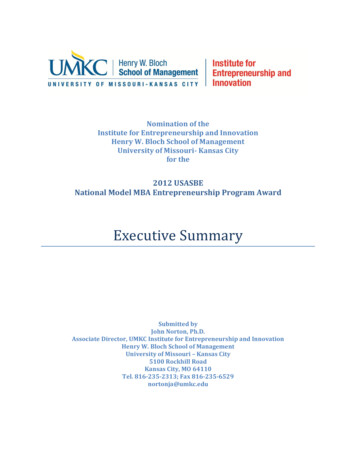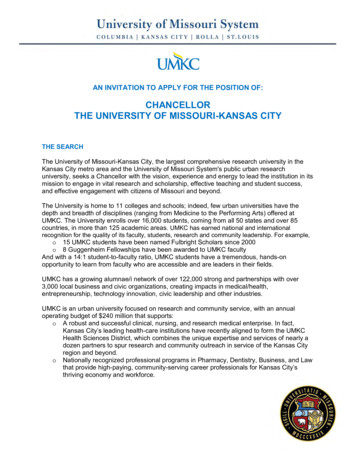
Transcription
AN INVITATION TO APPLY FOR THE POSITION OF:CHANCELLORTHE UNIVERSITY OF MISSOURI-KANSAS CITYTHE SEARCHThe University of Missouri-Kansas City, the largest comprehensive research university in theKansas City metro area and the University of Missouri System's public urban researchuniversity, seeks a Chancellor with the vision, experience and energy to lead the institution in itsmission to engage in vital research and scholarship, effective teaching and student success,and effective engagement with citizens of Missouri and beyond.The University is home to 11 colleges and schools; indeed, few urban universities have thedepth and breadth of disciplines (ranging from Medicine to the Performing Arts) offered atUMKC. The University enrolls over 16,000 students, coming from all 50 states and over 85countries, in more than 125 academic areas. UMKC has earned national and internationalrecognition for the quality of its faculty, students, research and community leadership. For example,o 15 UMKC students have been named Fulbright Scholars since 2000o 8 Guggenheim Fellowships have been awarded to UMKC facultyAnd with a 14:1 student-to-faculty ratio, UMKC students have a tremendous, hands-onopportunity to learn from faculty who are accessible and are leaders in their fields.UMKC has a growing alumnae/i network of over 122,000 strong and partnerships with over3,000 local business and civic organizations, creating impacts in medical/health,entrepreneurship, technology innovation, civic leadership and other industries.UMKC is an urban university focused on research and community service, with an annualoperating budget of 240 million that supports:o A robust and successful clinical, nursing, and research medical enterprise. In fact,Kansas City’s leading health-care institutions have recently aligned to form the UMKCHealth Sciences District, which combines the unique expertise and services of nearly adozen partners to spur research and community outreach in service of the Kansas Cityregion and beyond.o Nationally recognized professional programs in Pharmacy, Dentistry, Business, and Lawthat provide high-paying, community-serving career professionals for Kansas City’sthriving economy and workforce.
ooThe only Conservatory of Music and Dance in the state, as well as a uniqueInterdisciplinary PhD program, dynamic schools of Biological Sciences and Education,and a vibrant and comprehensive College of Arts and Sciences.A successful athletics program with membership in the Western Athletic Conference, asource of great pride for students and alumnae/i.The two campuses of UMKC are located in the midst of the Kansas City urban landscape.Named one of the top 100 “green campuses” by the Sierra Club, the physical campus footprint,coupled with a long tradition of civic and business collaborations, and a culture that reflects thecommunity of which it is a part, has earned UMKC the title “Kansas City’s University.”Philanthropic contributions and the successful completion of an ambitious capital campaignhave created recent and immediate impacts on the university through the efforts of engagedalumnae/i, a dedicated Foundation, and supportive organizations and corporations.In 2016, more than 47 million was raised, the last and final year of a capital campaign thatyielded a total of over 302 million in giving.Since its charter as the University of Kansas City in 1929, to its first graduating class in 1936,UMKC has built a story that is one of partnerships and progress, expansion and education,scholarship and service. The University’s intellectual and cultural significance to the urbanmetropole (which includes the eastern Kansas counties bordering the city), and, as part of theUM System, to the state of Missouri, is significant.UMKC has an ambitious vision for the future, and we invite you to learn about the direction inwhich they are heading and the values they hold dear.VisionUMKC will become a model urban research university characterized by signature graduate andprofessional programs; a dynamic undergraduate population; a highly diverse faculty, staff andstudent body; and active engagement with its city and region.Mission StatementUMKC's mission is to lead in life and health sciences; to deepen and expand strengths in thevisual and performing arts; to develop a professional workforce and collaborate on urban issuesand education; and to create a vibrant learning and campus life experience.The Curators and President of the University of Missouri System and the faculty, students andstaff of UMKC are eager to see the Kansas City campus take important steps forward in servingthe city, region, system and state as a public urban research institution.
The search committee is chaired by UMKC Faculty Senate Chair, Martha Jane Phillips StarrMissouri Distinguished Professor of Women's and Gender Studies and Professor of HistoryLinda Mitchell, and UMKC alum and former President and Chief Executive Officer of JE DunnConstruction Group Terry Dunn.HISTORY OF THE UNIVERSITYThe University of Kansas City was chartered in 1929; one year later, Kansas City businessmanand philanthropist William Volker donated 41 acres to the university. In 1931, Volker acquiredand donated the Dickey mansion, which would house the first library, classrooms, cafeteria andadministrative offices. UKC’s first classes began in 1933 with 17 instructors and 265 studentsenrolled. In 1936, 80 students became UKC’s first graduating class.With the founding of the university, UKC and Kansas City leaders wasted no time expanding,constructing three new buildings in three years. The first building constructed specifically for theuniversity, Mannheim Hall, was built in 1935; Newcomb Hall came one year later, designed tobe the school’s library. Haag Hall was built in 1937.Students also wasted no time forming their identity. In 1934, the student council named “oldgold and royal blue” the official school colors. Kasey the Kangaroo – drawn by Kansas Citynative Walt Disney as the symbol for the debate team – became UKC’s official mascot in 1937.Intercollegiate athletics and fraternities and sororities were approved by the trustees in 1954.In 1953 the university changed its mission to become an urban serving university, creating theSchool of Business and Public Administration in 1954, and the School of Education in 1956, aspart of this mission. UMKC has consistently added programs, such as the departments ofCriminal Justice and Criminology and Architecture, Urban Planning and Design, to enhance theuniversity’s ability to continue its mission to the people of Kansas City.Academics expanded, too, as UKC partnered with area schools to add more divisions,programs and majors. In 1938, Kansas City School of Law merged with UKC to form the LawSchool and, in 1941, the Kansas City-Western Dental College (founded in 1881) joined UKC.With the merger of UKC and the Kansas City School of Pharmacy (founded in 1885) in 1943,the university’s mission to lead in the health sciences took shape. The School of Pharmacy isstill the only public pharmacy program in the state of Missouri. The School of Medicine followedin 1971, Nursing and Health Studies in 1979 and, in 1985, the School of Biological Sciences,completing the university’s mission to be a comprehensive health sciences campus. TodayUMKC’s Hospital Hill Campus is dedicated to this aspect of the university’s mission.From its inception the university has had a strong tradition in the performing arts. UMKC’sConservatory of Music and Dance, founded in 1906 as The Kansas City Conservatory of Musicand Art, and merging with the Horner Institute of Fine Arts in 1926, joined UKC in 1959. This
tradition was furthered with the merger and the formation of the Kansas City Repertory Theatrein 1964 as part of the Department of Theatre in the College of Arts and Sciences. In 1979, theJames C. Olson Performing Arts Center was completed. Currently home to both theConservatory of Music and Dance and the Kansas City Repertory Theatre, the “PAC” is anintegral part of Kansas City’s cultural character. Completion of UMKC’s proposed DowntownArts Campus, across the street from the renowned new Kauffman Center for the PerformingArts, promises to solidify the university’s position as one of the premier performing artsinstitutions in the country.One of the university’s most important moves came on July 25, 1963, when UKC joined theUniversity of Missouri System. Expansion of the university’s footprint followed, including theconstruction of Katz Hall (1965), Miller Nichols Library (1965), Royall Hall (1968) and theEducation Building (1969).The UMKC School of Medicine, founded in 1971, offers the only six-year combined Bachelor [ofArts or of Science]/M.D. program in the Midwest. Located on the Hospital Hill campus, theMedical School has now graduated over 3,000 M.D.s.Recent advances, such as LEED certified buildings and the 2009 establishment of the UMKCFoundation, have helped the university continue to serve students and the community to a highstandard, and to succeed in its mission to become the region’s leading urban researchuniversity.IMPACT AND SCOPEThe University of Missouri System has served as an engine of social and economic mobility forcitizens since its founding and the leaders it has produced have sought and found creativesolutions for some of the most intractable problems facing the state of Missouri, the nation, andthe world. A pillar of the UM System at large, UMKC’s College, Schools, and departmentsprovide comprehensive disciplinary and interdisciplinary education, community leadership andcollaboration. Along with its philanthropic partners, the UMKC Trustees and the UMKCFoundation, UMKC is poised to continue to build programmatic excellence and enhance itssocial impact.Schools, Colleges and Departments of UMKCSchool of LawThe UMKC School of Law is the urban law school of the University of Missouri system andprovides its students with a comprehensive, affordable legal education comprised of apersonalized admissions process, collaboration with supportive faculty, real-world opportunitiesin a vibrant city, and tools and skills to experience professional success.
School of DentistryThe UMKC School of Dentistry has a deeply rooted reputation for innovative leadership indental education. For more than a century, the school has led the way by preparing the nextgeneration of oral health care professionals, conducting cutting-edge research, delivering highquality care to patients and allowing professionals to elevate their careers through ourcontinuing education and practitioner training programs.School of MedicineThe University of Missouri opened a medical school in Kansas City in 1971 to meet the healthcare needs of Missouri and the nation. Using an alternative approach to medical education fromthat of the traditional four-year school, the UMKC School of Medicine accepts students directlyout of high school for the combined baccalaureate/ Doctor of Medicine program, which allowsstudents to graduate in six years with their medical degree.School of EducationOffering 18 undergraduate, post-bachelors, master’s, educational specialist and doctoralprograms, the school’s mission is to recruit, prepare, and support outstanding teachers, mentalhealth professionals and administrators who will create lifelong learning opportunities for diverseurban communities. The School of Education, which is NCATE-accredited, is organized intothree academic divisions: Teacher Education and Curriculum Studies; Educational Leadership,Policy and Foundations; and Counseling and Educational Psychology.School of Nursing and Health StudiesThe School of Nursing and Health Studies prepares nurses and health professionals as leadersin improving health outcomes through inter-professional practice, research, service andeducation. Through nationally recognized undergraduate and graduate programs, the Schoolleads in the preparation of health professionals who enhance practice, education and research,and promote lifelong learning.School of PharmacyFor more than 130 years, the UMKC School of Pharmacy has continued its mission to educate,innovate, discover, engage and serve to improve health. Our pharmacy professional degreeprogram is nationally recognized for community engagement and service learning, and ourgraduate programs and research activities have led the National Institutes of Health to rank usconsistently in the top third of pharmacy schools.Conservatory of Music and DanceThe UMKC Conservatory of Music and Dance is internationally recognized as a center forartistic excellence, innovation and engagement with our communities. In rehearsals, in classand on stage, our students interact with an exceptionally gifted faculty and with leading visitingartists in ways that are supportive, yet rigorous.
The Henry W. Bloch School of ManagementAs a leader in 21st-century management education, the Bloch School offers undergraduate,graduate and doctoral degrees, as well as executive non-degree certificates. The Bloch Schooldevelops purposeful, entrepreneurial and innovative leaders to meet changing global demands,and advances knowledge and practice through excellent teaching, scholarship, outreach andservice.School of Biological SciencesThe School of Biological Sciences oversees outstanding research and academic degreeprograms in modern biological sciences. The School offers undergraduate, graduate anddoctoral degree programs in a number of life science-related disciplines. The School isorganized in two divisions, the Division of Cell Biology and Biophysics and the Division ofMolecular Biology and Biochemistry.College of Arts and SciencesUMKC’s College of Arts and Sciences, which comprises 19 departments and houses numerousinterdisciplinary programs, promotes the development of an enlightened society by fostering thediscovery of new understandings of the arts, humanities, sciences and social sciences, and bymaking its educational resources widely available to the public. Upper-division and graduateprograms prepare students for leadership roles in the arts and humanities, sciences, businessand industry, education, government, health organizations and social-service agencies. TheCollege also engages students at the doctoral level through the innovative Interdiscipinary Ph.D.program.School of Computing and EngineeringKnown for its small class sizes and personal attention, UMKC computing and engineeringstudents are challenged to meld innovative thinking with technical principles. Students work withfaculty who are recognized nationally and internationally for their contributions to the fieldthrough research, presentations and publications. Graduates benefit from UMKC’s location inKansas City, one of the largest engineering and computing communities in the United States.Honors CollegeThe Honors College seeks to develop independent scholars and challenges them to achievetheir potential. With the mandate to attract high-achieving students to UMKC, the HonorCollege’s goal is to build a community of engaged learners who will enhance UMKC’s reputationas an academic leader through superior scholarship, ethical integrity and communityengagement.University CollegeUniversity College is a portal of entry with relevant support services for UMKC’s exploratory/undeclared undergraduate students. Its mission is to offer every exploratory student theopportunity for success through engagement with faculty and staff, the development of
educational plans, the clarification of career and life goals, and the appreciation of the value ofthe core skills developed through UMKC's general education program.The School of Graduate StudiesThe school offers more than 50 graduate degrees at the master’s, educational specialist anddoctoral levels, plus a number of graduate certificates. The highly diverse population ofgraduate students in these programs represent about 35 percent of the total campus enrollment.As an urban university, our programs strive to accommodate adult working students.LibrariesThe University Libraries are an essential partner in intellectual discovery, knowledge creationand empowerment, and serves as the hub of learning activities for students, researchers andUMKC's urban neighbors. Miller Nichols Library, located on the Volker campus, is UMKC’slargest library and houses the general collection, Music/Media Library, LaBudde SpecialCollections, Marr Sound Archives, and University Archives. On the Health Sciences campus,the Dental Library and Health Sciences Library serve students and researchers in thosedisciplines. Along with its partners, the UMKC School of Law’s Leon E. Bloch Law Library andthe Linda Hall Library (a private, independent research library of science and technology locatedin the center of the Volker campus), the University Libraries are the comprehensive publicresearch library for Kansas City and the very heart of UMKC.AthleticsUMKC’s Intercollegiate Athletics is a source of great pride for an engaged and regionally activealumnae/i. As a member of the Western Athletic Conference (WAC), the UMKC Kangaroos,known to Kansas Citians everywhere as the “Roos,” compete in Men’s and Women’sBasketball, Soccer, Cross Country, Golf, Tennis, Track and Field, and Women’s Softball andVolleyball. UMKC supports its student athletes in their academic and social pursuits withengaging and experiential programming that brings the fans, schools and programs together.UMKC FoundationFounded in 2009, at the urging of the Greater Kansas City Community Foundation, the UMKCFoundation is devoted to raising funds for the university and for exercising fiduciaryresponsibility over endowments and other philanthropic investments made to UMKC. TheUMKC Foundation’s purpose is to enable strong, sustained leadership to advance theuniversity’s interests with the goal of achieving “the strategic vision for urban higher educationthat Kansas City needs.” Having just completed its first capital campaign in 2016, TheCampaign for UMKC, the Foundation brought in over 302 million, illustrating its impact andability to take UMKC and its community to the next level.UMKC TrusteesThe UMKC Board of Trustees is a non-profit organization established by civic and communityleaders to support the University. The UMKC Trustees represent the spectrum of Kansas City’s
business, civic and philanthropic leadership. Advocating on the University’s behalf, the Trusteesprovide community feedback and forge partnerships to help the University achieve its strategicpriorities and financial objectives.UMKC Alumni AssociationFounded in 1966, the UMKC Alumni Association represents and connects more than 120,000alumnae/i worldwide to the university and to one another. Representing the university’s largestconstituency, the Alumni Association’s mission includes advocating for the university and highereducation, highlighting the accomplishments of UMKC and its graduates, and maintaining thelifelong bonds between alumnae/i and their alma mater. Priorities include advocacy for thecampus’s strategic plan and priorities, enhancing alumnae/i participation and engagement, andincreasing visibility of UMKC’s alumnae/i and their achievements. The 30-member AlumniAssociation Governing Board includes the presidents of UMKC’s school-based alumnae/iboards, which are chartered by the Association and reflect the alumnae/i base’s strongacademic unit affinity.Constituent Advocacy: Breadth and Depth of EngagementThe University has more than 60 constituent boards working and advocating on its behalf. Onan annual basis, those groups represent more than 3,000 volunteers engaged with the campusproviding guidance to faculty and deans, mentorship to students, programming and fundraisingfor UMKC’s students and programs. Volunteers include both alumnae/i and civic and communitymembers, all representing a deep and extensive scope of engagement with the region.Together, these and other major components of
UMKC has an ambitious vision for the future, and we invite you to learn about the direction in which they are heading and the values they hold dear. Vision . UMKC will become a model urban research university characterized by signature graduate and professional programs; a dynamic unde
